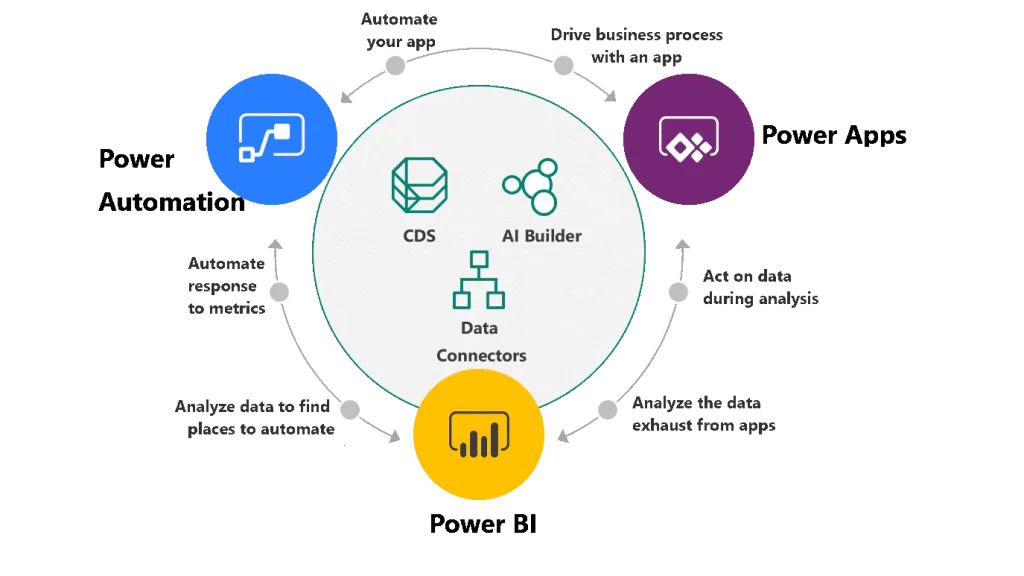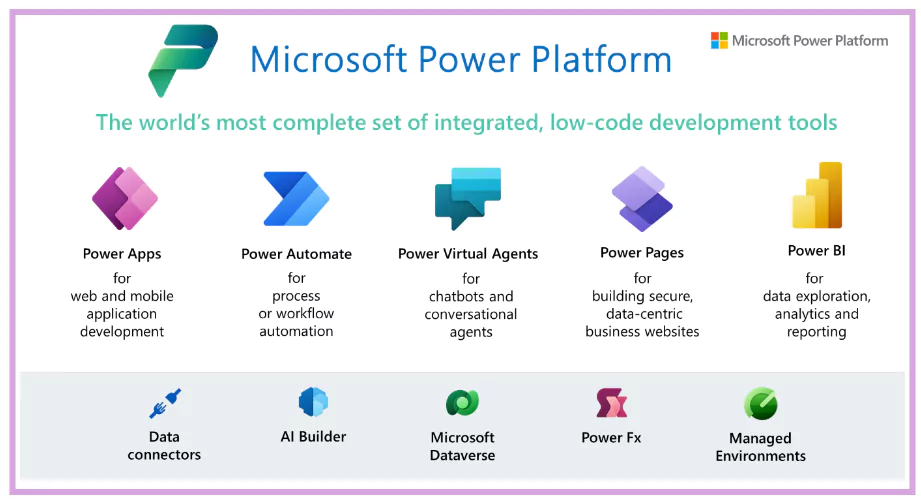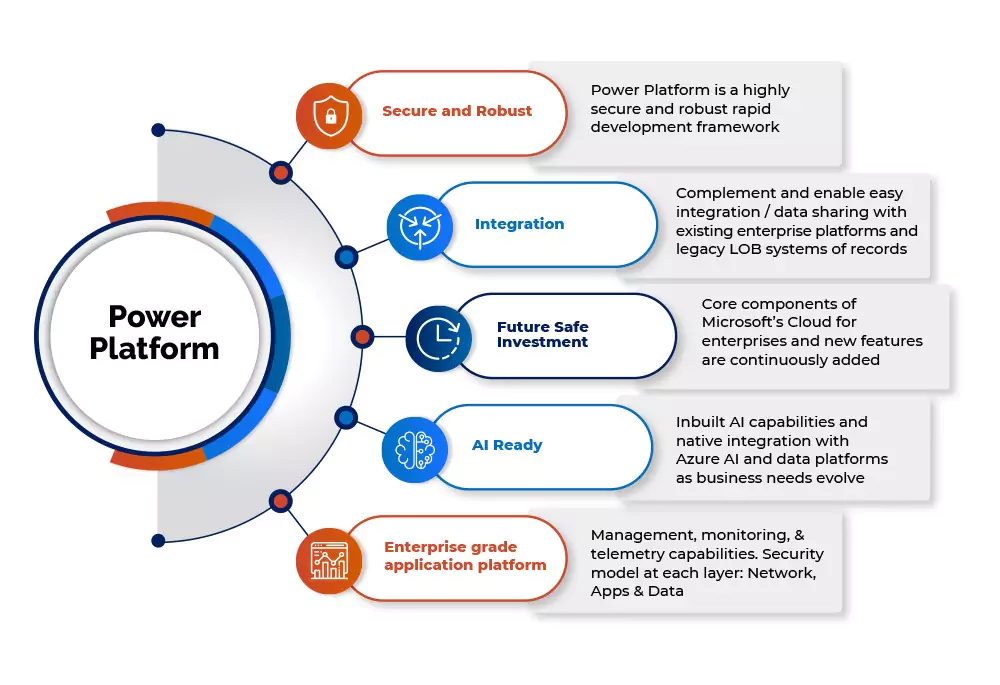- Lavelle Road, Bangalore
- contact@basofa.com

Microsoft Power Platform is a versatile solution to all your organizational needs. Popular for its innovative capabilities, this platform helps businesses automate, develop, and utilize the power of data for improved business decisions.
So, what is Microsoft Power platform, and how does it help businesses? In this blog, we will explore the platform’s features, different use cases, and benefits.
What is Microsoft Power Platform?

The Microsoft Power Platform comprises a collection of low-code and no-code development utilities, allowing users to create applications effortlessly.
The platform helps users manage data better and easily visualize valuable data sources. Moreover, businesses can optimize operations with:
• Highly accessible functionalities for daily use
• Data-driven applications
• Customizable business logic for end-to-end business solutions
For improved workflows, businesses can extend Microsoft 365, Dynamics 365, Azure, and other third-party services and applications.
Coming to Microsoft Power platform fundamentals, the platform has four primary components. Businesses can use these components individually or combine them to boost workflow efficiency.
The four key components of Microsoft Power platform architecture are:
1. Power BI: This analysis tool helps businesses quickly grab valuable insights from several datasets. It facilitates faster implementation of critical changes in business processes.
2. Power Apps: This collection of low-code tools helps create custom business applications. These tools are accessible to both technical and non-technical users and help them:
• Create professional apps suited to every need
• Develop automated workflows
• Connect with various data sources
• Combine dashboards and apps seamlessly
3. Power Automate: Power Automate provides no-code tools that help automate routine manual tasks and processes. It offers pre-built connectors, AI assistants, and templates to facilitate business operations.
4. Power Pages: Power Pages help businesses develop their websites with minimum coding. Businesses can build an engaging company website using pre-built themes, data forms, lists, and more.
Earlier, the Microsoft Power platform services also included Power Virtual Agents. However, it is now a part of Microsoft Copilot Studio. This application is used to build intelligent chatbots without complex coding.
What is Microsoft Power Platform Used For?

Microsoft Power Platform works on a unified data model. It facilitates data-sharing across processes and applications for increased operational efficiency.
Let’s see how different industries can use this platform.
1. Healthcare
• Manage patient data using customized apps for data entry and scheduling appointments.
• Automate manual administrative tasks like insurance processing to simplify billing.
• Track trends in health conditions and treatment outcomes using Power BI dashboards. It lets organizations implement improved healthcare delivery solutions.
2. Finance
• Automate workflow for faster loan approvals.
• Assess lending risks using Power BI.
• Create easy-to-use apps for loan applications.
3. Education
• Custom apps for student enrollment.
• Power BI to assess student performance and identify the scope of improvement.
4. Manufacturing
• Build customized apps for inventory management.
• Implement automated processes for quality control.
• Monitor equipment performance and predict maintenance needs with Power BI.
5. Retail
• Create apps for inventory tracking.
• Analyze customer experience and feedback with Power BI.
6. Corporate
• Streamline interview processes.
• Build applications for employee management.
• Power BI to gather useful business insights for building innovative solutions.
What are the Benefits of Microsoft Power Platform?

The components of the Power platform, with their code solutions offer several benefits for businesses across all industries. Here are the key benefits businesses get by utilizing the Microsoft Power :
1. Manages Business Processes in a Unified Platform: The platform, which includes Power BI, provides 360 visibility on every business operation on a single dashboard. It helps businesses analyze data to report and tackle roadblocks, and identify solutions, all in one place.
2. Easy to Use for All: The Microsoft Power platform offers equal capabilities for technical and non-technical users. The platform presents a host of low-code and no-code solutions. They have simple user interfaces that are easily accessible to all.
3. Seamless Integration Across Multiple Devices: The Microsoft Power Platform offers straightforward integration, allowing a smooth transition and operation across various devices. This feature ensures that users can seamlessly access and collaborate using the platform’s applications, whether on a phone, tablet, or computer, fostering efficiency and unity in team activities.
4. Minimizes the Use of Third-Party Tools: Organizations can avoid the complexities and additional costs associated with third-party solutions by integrating analytics, automation, and application development within one system. This not only streamlines operations but also enhances data security and governance, as all tools are maintained under the robust Microsoft framework, promoting a more efficient and controlled environment.
5. Easy Integration with Microsoft 365: Users can seamlessly integrate the Power platform with other Microsoft services. This includes services like Microsoft 365, Azure, and Dynamics 365. It helps them create a unified ecosystem of free-flowing data for higher accuracy. It also boosts collaboration and enhances teamwork.
6. Extensive Cost Savings: With tools like Microsoft Power Apps and Automate, businesses can reduce developmental costs. They can also minimize manual errors in the processes. Moreover, data analytics and workflow automation reduce operational costs. All these clubbed together lead to overall cost reduction and improved ROI.
Wrapping Up
So, what is Microsoft Power platform? Simply put, it is a strategic asset that can help businesses evolve and innovate. It offers dynamic solutions to critical organizational challenges, helping businesses optimize their process.
It empowers businesses to adapt quickly to changes and drive workflow efficiency, yet protects valuable data with strong security measures. With its multifold capabilities, the platform helps businesses gather data insights and implement them to take their organization toward success.
Frequently Asked Questions
1. What are the four components of Power Platform?
The four primary components of the Power platform include:
• Power Apps
• Power Automate
• Power BI
• Power Pages
Dataverse is also a part of the Power platform, which is a cloud-scale data store. Another significant part of the platform is Power Virtual Agents. However, it has now merged with Microsoft Copilot Studio.
2. Is Microsoft Power Platform free?
Businesses can get the free Power App Developer Plan to explore the platform’s capabilities. However, for production, they will have to take a subscription for each application.
3. Is Power Platform a CRM?
The Power platform is not a CRM, but it helps businesses build CRM apps using the tools offered in Power App.
